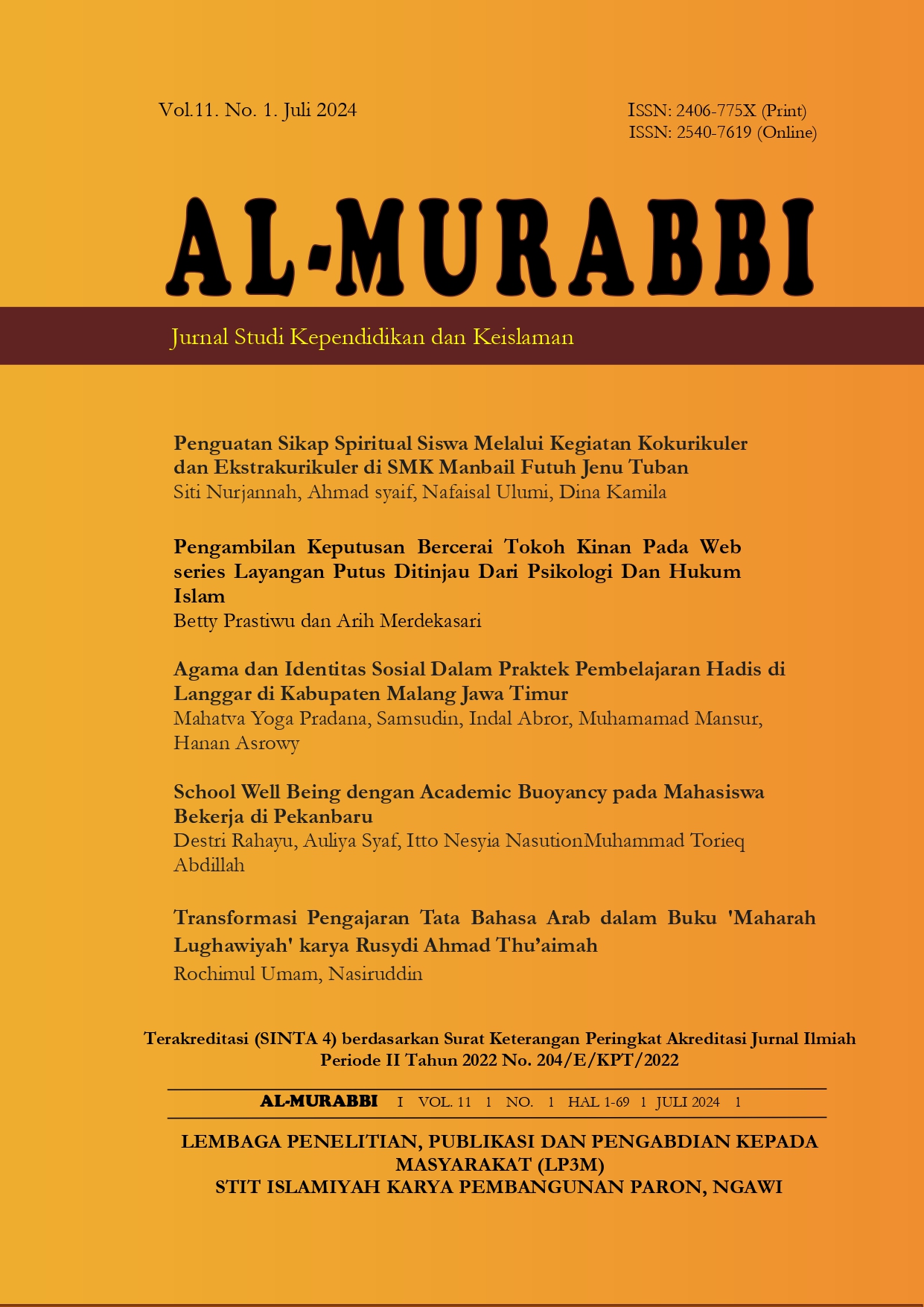Pengambilan Keputusan Bercerai Tokoh Kinan Pada Web series Layangan Putus Ditinjau Dari Psikologi Dan Hukum Islam
Abstract
Abstract: The research aims to find out how the decision to divorce the character Kinan in the web series Kite Putus is viewed from psychology and Islamic law. The research method uses a qualitative approach in the study of Cyberliterary Psychology. The research was carried out by watching the web series to be analyzed descriptively and inductively, then created in the form of text and analyzed. Descriptive analysis describes the aspects and characteristics of the message, while inductive analysis is used to understand and examine the meaning. The data source was obtained from the rater through a questionnaire that met the gender requirements of female, Islamic religious education student and early adulthood. Next, the data was validated through an inter-rater test. Kinan's character's psychological decision-making process goes through five stages. First, assess the challenges stemming from the phenomenon of changes in her husband's attitude which gives rise to confusion and suspicion, then encourage her to collect data and information to find the reasons for the change in her husband's attitude. Second, an alternative survey regarding the findings of physical evidence and information originating from Kinan's friends and people around Aris, which leads to proof of her husband's infidelity. Third, consider alternatives by carrying out a negative evaluation of the loss of hope of forming a harmonious family and the opportunity to live a new life while maintaining one's self-esteem. Fourth, declare your commitment, express your stance by suing Aris in court while continuing to consult with friends who are competent in the legal field. Also, keep sharing with friends who can provide in-depth insight into the correct attitude in dealing with developments in family problems. Fifth, survive negative feedback, face her husband's negative attitude by continuing to manage negative emotions and focus on gathering evidence that clarifies her husband's commitment to polygamy. Meanwhile, the Kinan character's decision to divorce in terms of Islamic law is permissible because it meets the requirements for being included in the Fasakh case or not. can be corrected again because Aris' behavior violates Islamic religious law as stated in the Al-Quran surah An-Nur verses 30-31. The problems include infidelity and quarrels which cause her to not be able to get back together with her husband.
Keywords: Cybersastra, Decision making, Islamic law, Psychology, Web series.
Downloads
References
Adhi R Chandra. “Web Series Layangan Putus Sedang Digandrungi, Berikut Link Lengkap dari Episode Pertama.” Portal Jogja, January 2, 2022. https://portaljogja.pikiran-rakyat.com/entertainment/pr-253376358/web-series-layangan-putus-sedang-digandrungi-berikut-link-lengkap-dari-episode-pertama?page=all.
Afriyandi, Rikho, and Khabib Mustofa. “Revitalisasi Muraqabah Dalam Pernikahan: Ikhtiar Mencegah Hadirnya Orang Ketiga.” Al-Syakhshiyyah 3, no. 2 (December 7, 2021): 363414. https://doi.org/10.35673/as-hki.v3i2.1713.
Agus Abdul Rahman. Psikologi Sosial; Integrasi Pengetahuan Wahyu Dan Pengetahuan Empirik. Depok: Rajawali Press, 2013.
Aning Az Zahra and Aftina Nurul Husna. “(PDF) Dinamika Pengambilan Keputusan Dan Perkembangan Jiwa Wirausaha Pada Mahasiswa.” ResearchGate. Accessed June 5, 2024. https://doi.org/10.15575/psy.v6i1.3464.
Ardyaksa, Ananda Sevma, and Thomas Dicky Hastjarjo. “Pengaruh Film Alternatif Terhadap Emosi.” Gadjah Mada Journal of Psychology (GamaJoP) 2, no. 1 (January 2, 2018): 1–7. https://doi.org/10.22146/gamajop.31863.
Azizah, Nur. “Analisis Psikologi Tokoh Utama dalam Film ‘Flying Color’ Karya Nobutaka Tsubota.” Thesis, Universitas Sumatera Utara, 2018. https://repositori.usu.ac.id/handle/123456789/12522.
Clarissa Sylvia Dewi. “Dampak Perceraian Orangtua Bagi Perilaku Mahasiswa Universitas Airlangga.” Jurnal Unair 5, no. 2 (2016).
Debbyani Nurinda. “Belajar dari Kinan Layangan Putus, Jaga Harga Diri Hadapi Perselingkuhan - Semua Halaman - Sonora.id.” Accessed June 4, 2024. https://www.sonora.id/read/423103792/belajar-dari-kinan-layangan-putus-jaga-harga-diri-hadapi-perselingkuhan.
Farhanindya, Hikmah Husniyah, and Karolin Rista. “Dimensi Forgiveness Individu Yang Bercerai.” Prosiding Seminar Nasional Multidisiplin 2, no. 1 (November 12, 2019): 272–78.
Fauziah, Nailul, Yusmansyah Yusmansyah, and Diah Utaminingsih. “hubungan penggunaan strategi coping dengan prestasi akademik pada siswa kelas xi sma.” Alibkin (Jurnal Bimbingan Konseling) 4, no. 2 (December 22, 2015). http://jurnal.fkip.unila.ac.id/index.php/ALIB/article/view/10394.
Fiqih Rahmawati. “Wih! MD Entertainment Klaim Layangan Putus Trending di 25 Negara, Ini Daftarnya.” KOMPAS.tv, January 11, 2022. https://www.kompas.tv/entertainment/250429/wih-md-entertainment-klaim-layangan-putus-trending-di-25-negara-ini-daftarnya.
Haryanto, Nur. “Layangan Putus Yang Laris Manis.” Tempo, February 3, 2022. https://newsletter.tempo.co/read/1556880/layangan-putus-yang-laris-manis.
K, Zulfa Safitri, and Amirudin Amirudin. “Keputusan Perempuan Memaafkan Ketidaksetiaan Pasangan.” Endogami: Jurnal Ilmiah Kajian Antropologi 4, no. 2 (June 10, 2021): 61–70. https://doi.org/10.14710/endogami.4.2.61-70.
Kazuhisa Takemura. Behavioral Decision Theory. Springer Singapore, 2021. https://link.springer.com/book/10.1007/978-981-16-5453-4.
Lesilolo, Herly. “Penerapan Teori Belajar Sosial Albert Bandura Dalam Proses Belajar Mengajar Di Sekolah.” Kenosis: Jurnal Kajian Teologi 4 (June 18, 2019): 186–202. https://doi.org/10.37196/kenosis.v4i2.67.
Lucky Aziz Hakim. wawancara Hakim Pengadila Agama Ngawi, February 21, 2022.
Mahkamah Agung. Himpunan Peraturan Perundang-Undangan Yang Berkaitan Dengan Kompilasi Hukum Islam Serta Pengertian Dalam Pembahasannya. Jakarta: Mahkamah Agung, 2011. https://lib.ui.ac.id.
Manna, Nibras, Shinta Doriza, and Maya Oktaviani. “Cerai Gugat: Telaah Penyebab Perceraian Pada Keluarga Di Indonesia.” JURNAL Al-AZHAR INDONESIA SERI HUMANIORA 6 (March 26, 2021): 11. https://doi.org/10.36722/sh.v6i1.443.
Moordiningsih, -, and - Faturochman. “Proses Pengambilan Keputusan Dokter.” Jurnal Psikologi 33, no. 2 (2006): 79–93. https://doi.org/10.22146/jpsi.7077.
Nasution, Muhammad Arsad. “Perceraian Menurut Kompilasi Hukum Islam (KHI) Dan Fiqh.” Jurnal EL-QANUNIY: Jurnal Ilmu-Ilmu Kesyariahan Dan Pranata Sosial 4, no. 2 (December 30, 2018): 157–70. https://doi.org/10.24952/el-qanuniy.v4i2.2385.
Nuha, Siti Ulin, Erik Aditia Ismaya, and Much Arsyad Fardani. “NILAI PEDULI SOSIAL PADA FILM ANIMASI NUSSA DAN RARA.” Jurnal Riset Pendidikan Dasar 4, no. 1 (2021): 17–23.
Rindi. “Indonesia Negara Kedua di Asia yang Banyak Kasus Selingkuh.” POPMAMA.com, May 15, 2023. https://www.popmama.com/life/relationship/rindi-1/indonesia-negara-kedua-di-asia-yang-banyak-kasus-selingkuh.
Ryan Suherlan. “Serial Layangan Putus yang Viral di Media Sosial Diangkat dari Kisah Nyata.” PT. Kontan Grahanusa Mediatama, December 30, 2021. https://lifestyle.kontan.co.id/news/serial-layangan-putus-yang-viral-di-media-sosial-diangkat-dari-kisah-nyata.
Santrock, John W. Psikologi Pendidikan. Jakarta: Kencana Prenada Media Group, 2007.
Shaleha, Rinanda Rizky Amalia, and Iis Kurniasih. “Ketidaksetiaan : Eksplorasi Ilmiah Tentang Perselingkuhan.” Buletin Psikologi 29, no. 2 (December 2, 2021): 218–30. https://doi.org/10.22146/buletinpsikologi.55278.
Siti Sarah Nurhayati. “Layangan Putus Trending di 25 Negara, Dapat 15 Juta Klik Sehari! - Semua Halaman - Nova.” Accessed June 4, 2024. https://nova.grid.id/read/053102700/layangan-putus-trending-di-25-negara-dapat-15-juta-klik-sehari.
Suwardi Endraswara. Metodologi Penelitian Sastra. Jakarta: MedPres, 2008.
Widiyarto, Sigit, Lidya Sartono, and Mu’thia Mubasyira. “Analisis Nilai Pendidikan Karakter Dan Moral Film Koala Kumal.” Pena Kreatif : Jurnal Pendidikan 9 (November 14, 2020): 50. https://doi.org/10.29406/jpk.v9i2.2328.
Yefta Christopus Asia Sanjaya. “Menurut Survei, 60 Persen Orang Indonesia Suka Kisah Perselingkuhan.” KOMPAS.com, February 24, 2022. https://lifestyle.kompas.com/read/2022/02/24/144243220/menurut-survei-60-persen-orang-indonesia-suka-kisah-perselingkuhan.
Copyright (c) 2024 AL-MURABBI: Jurnal Studi Kependidikan dan Keislaman

This work is licensed under a Creative Commons Attribution-ShareAlike 4.0 International License.











